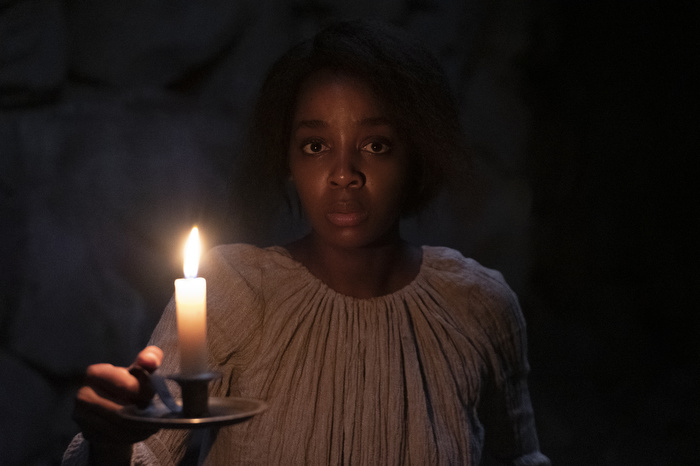What to Watch Verdict
When Barry Jenkins aims to deconstruct tropes and reinvigorate entire genre, he doesn’t miss. Masterpiece is barely an adequate word for The Underground Railroad.
Pros
- +
Phenomenal performances
- +
Incredible Visuals
- +
Perfect Scoring
- +
Astounding integration of the source material
Cons
- -
Prime Video should've done an episodic drop for the series. There's so much to each chapter, a little in between time to digest wouldn't hurt.
This post contains mild spoilers for The Underground Railroad.
Barry Jenkins’s adaptation of Colson Whitehead’s Pulitzer Prize-winning novel, The Underground Railroad, is a brilliant ten-hour odyssey tailored to unsettle, engage, and captivate. Jenkins not only elevates Whitehead’s story, he masterfully bends the Southern Gothic genre to his will.
Most filmmakers adopting a Southern Gothic aesthetic shy away from connecting their work to the genre’s bloodier antebellum hallmarks in their period pieces. Choosing instead to funnel that twisted malignancy of racism, sexism, fear of societal decay into more palatable themes like human fallibility, judgment, self-destruction. Subjects easily divorced from their historical context.
It’s a sad yet unavoidable truth, that telling a story with its roots set deep in America’s past that centers Black people, means enslavement has to play a part in the historical landscape. Building a storyline around Black people living in the antebellum South, in particular, requires incorporating the brutality, lack of agency, and pernicious ideologies that control(led) society. It is not true, however, that the central focus of any such story must be aimed at slavery "the institution.”
The intent of a Southern Gothic is to examine the “values” of the American South, so to speak, through sinister or macabre happenings. Thankfully irony and nuance play a large part in digging into social issues. So set aside any assumptions, expectations, or fears, that a story set in the pre-Civil War South has no choice but to fall into the shallow groove for “unmasking” slavery previous films opted for. Because when Director Barry Jenkins aims to deconstruct myths and reinvigorate a genre steeped in the mystical and touched by madness, he doesn’t miss.
The Underground Railroad is, primarily, the story of Cora Randall (Thuso Mbedu) a young enslaved woman living on a plantation in Georgia. Cora believes her mother, Mabel, abandoned her to escape to freedom. She’s outwardly stoic but internally vacillates between despair, anger, and grim pragmatism. When Caesar (Aaron Pierre), a young enslaved man approaches her about running away she resists. Caesar believes Mabel’s successful escape makes her daughter good luck. But Cora considers being left behind and ostracized by the other slaves a sign that she’s cursed.
It’s only once its frighteningly clear circumstances on the plantation will continue to become increasingly dire that Cora agrees to go with Caesar when he makes his break for freedom.The first hour ends with this intrepid duo boarding a train from an underground depot and riding off into the night. Thus beginning their exodus out of the South and an adventure viewers are absolutely not expecting. It's here that Whitehead’s historical fantasy really takes flight; because in this reality, the underground railroad isn’t a metaphor for a series of hiding places leading out of the South. There's an actual train running on a secret rail underground ferrying runaways from depots and safe havens to freedom.
The latest updates, reviews and unmissable series to watch and more!
To the uninitiated, this head-on presentation of antebellum life — the attitudes of white people (abolitionist and pro-slavery), societal norms offered so matter-of-factly and with an encroaching sense of doom — may feel decidedly unsettlingly. For those more familiar with documented slave narratives, every bit of worldbuilding that values fact over myth-making is needed sustenance. The end result is the least sideways presentation of American’s history onscreen to date.
Like any great Southern Gothic, this series blends magical realism and stark historical truths to reveal the sinister cultural character of America. Jenkins, like Whitehead, understands it’s long past time slave stories moved beyond being about “the chase” and started being about the people on the run. This isn't a story about slavery. It's a high stakes adventure where Cora must learn to trust herself and face her pain if she’s to stay one step ahead in a society intent on shoving her to her knees.
Between all the breathtakingly beautiful shots lending the series an exquisite etherealness, and Jenkin’s painstaking ability to hone in on just the right angle or scene composition, this series never loses sight of the humanity of its players. Watching as Caesar (portrayed with a poignant grace and power), a man who can read and longs to be valued for his intellect, struggles to retain his dignity is a performance few are likely to forget. In Mbedu’s hands, Cora is an evocative contradiction. She’s at turns full of hopeful vulnerability, ill-suppressed rage, painful defeat. Ever resilient in the face of seemingly unending obstacles and life-threatening danger. But her story isn’t pushed aside by her need to run from Ridgeway (Joel Edgerton), an obsessive slave hunter determined to return her to the plantation in Georgia to make up for never catching her mother Mabel. Each chapter focuses on how she spends her time between trips along the railway. Cora’s triumphs and trials are both uplifting and painfully indicative of the myriad of ways freedom remains elusive. With books like Gulliver's Travels and The Odyssey coupled with an elegantly crafted score acting as touchstones, this series is ultimately a comically cruel and harrowing elegy.
I, like most Black people, am extremely disinterested in stories playing out trauma narratives framed to either assuage non-Black people’s guilt or incite Black people to bitterness and rage. Most slave narratives aren't actually interested in exploring the lives or motivations of its non-white characters. This failure to present enslaved Black people as more than the degradation they suffer is why the subgenre offers little in a modern context. If people still need to be shown that the abolition of slavery is right and just in 2021, then they'll never be convinced.
Jenkins carves out space every episode for this ensemble to act with depth and conviction. The embellishments to Whitehead's story always provide clarity of purpose. This proves significant when delving into the motives and decisions made by white characters throughout Cora’s journey. It also means that when The Underground Railroad tackles heavy themes like the destruction of the Black family, maternal love, feelings of worthlessness, instinct, fear, and shame it happens through the relationships Cora witnesses, builds (or shies away from) along the way. Every supporting character is adequately developed in a captivating - and often tragic - subplot. So much so that not coming to understand what led to a decision or course of action would be wholly unexpected. In the hands of this cast of veterans and fresh faces, it’s a feat accomplished with seemingly effortlessness.
Jenkins recognizes how essential it is to establish the subtle push and pull that shapes an audience's understanding of both the personalities of a story’s players and the world against which its plot plays out. The Underground Railroad never flinches from the realities of slavery or white supremacy. There’s a marked purposefulness, a matter-of-factness in its presentation of daily life. No time gets wasted attempting to shoehorn in a “benevolent” overseer narrative or soften the potential of deadly violence. But neither is the point wallowing in the pain of living life in chains (literal or metaphorical). The series' decision to constantly examine America's history in relation to a woman grappling with the disheartening truth that no safe haven, subject to the whims of white people, will ever be safe enough is an outstanding cry for reformation all its own. It’s also a timely reminder that breaking free must be a journey geared towards gaining mastery over one’s self, as much as it ever is a trek out of horrid circumstances. Every color choice, camera angle, and aspect of production comes together in a gorgeously immersive where light, dark and silence are just as vital as the dialogue.
The Underground Railroad is hands-down the most revelatory Southern Gothic tale brought to screen in the last ten years. And neither 'slave' narratives nor historical fantasy will ever be the same. Take your time with it. It’s an absolute masterpiece.
All ten episodes of The Underground Railroad is available on Amazon Prime Video now.
Ro is a Rotten Tomatoes approved film/tv critic, writer and host on several of the MTR Network's podcasts. She's a member of the San Diego Film Critics Society and the Online Association of Female Film Critics. She's a former culture columnist for San Diego CityBeat (may it rest in peace) with a serious addiction to genre fiction, horror and documentaries. You can find her sharing movie and book recs and random thoughts, on her podcast I Talk Sh!t and Read or in her newsletter, Shelf Envy.


